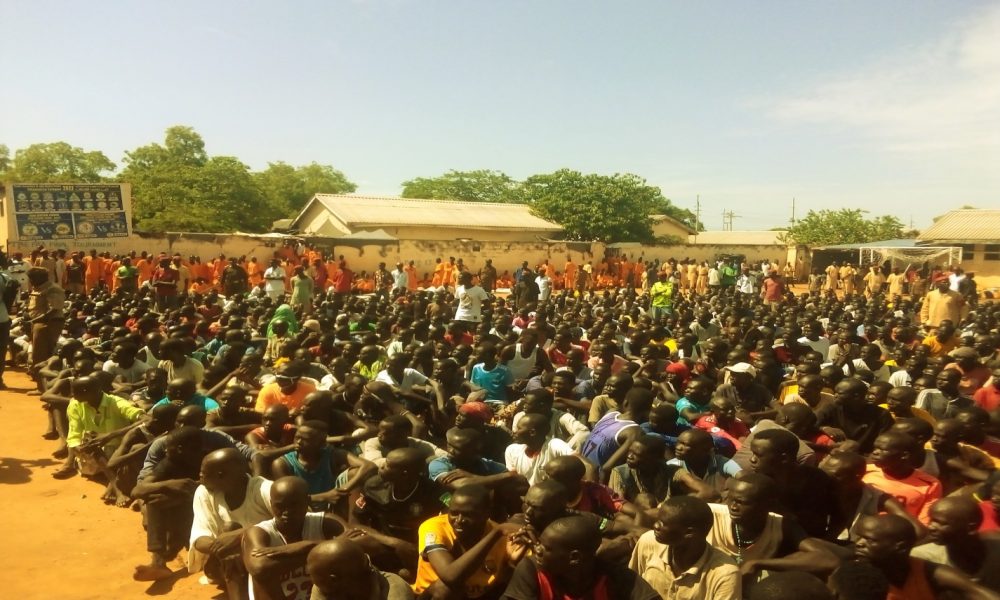By William Madouk
Director of Juba Central Prison has raised alarm over overcrowding of inmates, calling for reforms in the country’s criminal justice system to speed up trials to decongest the facility.
A visit to the facility on Thursday revealed a population standing at 2,767 inmates with about 194 are condemned, at least 707 convicted while 42 lunatics are in the prison.
Meanwhile, at least 1,824 inmates are on remand and 8 accompanying infants with their mothers.
Lt-Gen Atok Atem, Director of Juba Central Prison, said the facility was built decades ago to accommodate only 300 inmates but it’s now over congested to 929 percent of actual capacity.
“Overcrowding compared to 300 [capacity], it’s 929 percent because this building was only meant for 300 inmates [while] remands Vs convicted congestion is 185 percent,” Barac said.
He claimed that the congestion was because of over adjournment of court cases and lack of vehicles to transport prisoners to courts, adding that they only have one car for the mobility of inmates.
He rued over inadequate drugs, accrued water bills, and lack of food items, asserting that contractors warned to cut food supplies should their arrears not be settled within two months.
Gen. Barac suggests government builds a modern facility to de-congest Juba prison and he also appeals to the minister of finance to settle arrears as well as the minister of health to urgently intervene with drugs.
Chief Justice, Chan Reech Madut had on Wednesday led a delegation of the Minister of Justice and Constitution Affairs and a representative from Ministry of Interior to assess situation of the reformatory.
One inmate who spoke on behalf of remand prisoners, Mr. Nicola Nyieth Kon said prison wards are overcrowded to the extent that there is no place to put “your feet if you want to go to the washroom”.
“We have a washroom inside the ward, but you cannot get space to go there, forcing us to urinate on empty crystal bottles,” he explained.
Mr. Kon lamented that nine people sleep on a mate and if an inmate wants to change position – he must wake up his roommates so that all of them change positions together due to the limited space.
Chief Justice, Chan Reech Madut however said he introduce mobile court in order to speed up the trials but was shocked to hear the number of remands still in thousands.
He pledged to seek an explanation from designated judges.
“I introduce mobile court, I thought this was a solution to accelerate trials for you, but I didn’t get a report why it is still like this,” Justice Madut told prisoners during the inspection of Juba prison on Thursday.
He disclosed that the Ministry of Justice will see the issue of public prosecutors so that cases are urgently investigated and taken to court for trial to minimize the overcrowding and ask inmates to be patient.
He also cited that they will visit all ten state prisons to assess the situation of prisoners there and find ways to address their challenges.
Chief Justice objected to the claim of blood compensation case that was settled in 2014 and was later on reverted with the suggestion that the accuser had to pay again with the current value, terming it illegal.
Mr. Madut promised to increase the number of judges in prison services to speed up processes.
He also suggested that containers be bought to store foodstuff such as flour, and sugar for prisoners rather than money that will end up in an individual’s pockets.
Meanwhile, the minister of Justice and Constitutional Affairs, Ruben Madol said justice delayed is justice denied, asserting this now requires a joint meeting to examine the issues critically.
“For this issue to take years, is not good and that is what we want to understand how it happens that way,” Madol said.
Minister Madol also suggested a national justice conference to put back the justice system in the right path.
However, the director general of Juba Central Prison, Henry Kuanyin said inmates are only getting one meal of ‘beans’ per day.
He argued that most prisoners get sick due to lack of balanced diet, saying when the institution asks for funds from the Ministry of Finance – they are seen as exaggerating the figures.



